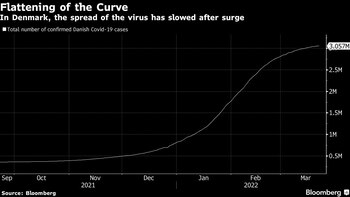
(Bloomberg) — Denmark, one of the countries where the omicron variant of covid-19 was first spread, estimates that around 70% of its adult population has contracted the virus since the beginning of November.
The estimate is based on antibody data from blood donors aged 17 to 72, according to a report released Tuesday by the country's infectious diseases institute. The rate is higher than what official tests suggest: the country of 5.8 million has recorded about 3 million positive results overall. If re-infections are excluded, approximately 50% of the population has tested positive.
This explains why the number of new daily cases has now declined, as Denmark has achieved a high level of immunity, also helped by vaccination programs, said Henrik Ullum, director of the institute. The Nordic country ended all restrictions on the virus on February 1, as omicron proved to be less dangerous than previous variants, allowing hospitals to cope with infections.
Original Note:
Denmark Says 70% of Population Got Covid in Five-Month Period
More stories like this are available on bloomberg.com
©2022 Bloomberg L.P.
Últimas Noticias
Debanhi Escobar: they secured the motel where she was found lifeless in a cistern
Members of the Specialized Prosecutor's Office in Nuevo León secured the Nueva Castilla Motel as part of the investigations into the case

The oldest person in the world died at the age of 119
Kane Tanaka lived in Japan. She was born six months earlier than George Orwell, the same year that the Wright brothers first flew, and Marie Curie became the first woman to win a Nobel Prize

Macabre find in CDMX: they left a body bagged and tied in a taxi
The body was left in the back seats of the car. It was covered with black bags and tied with industrial tape
The eagles of America will face Manchester City in a duel of legends. Here are the details
The top Mexican football champion will play a match with Pep Guardiola's squad in the Lone Star Cup

Why is it good to bring dogs out to know the world when they are puppies
A so-called protection against the spread of diseases threatens the integral development of dogs




